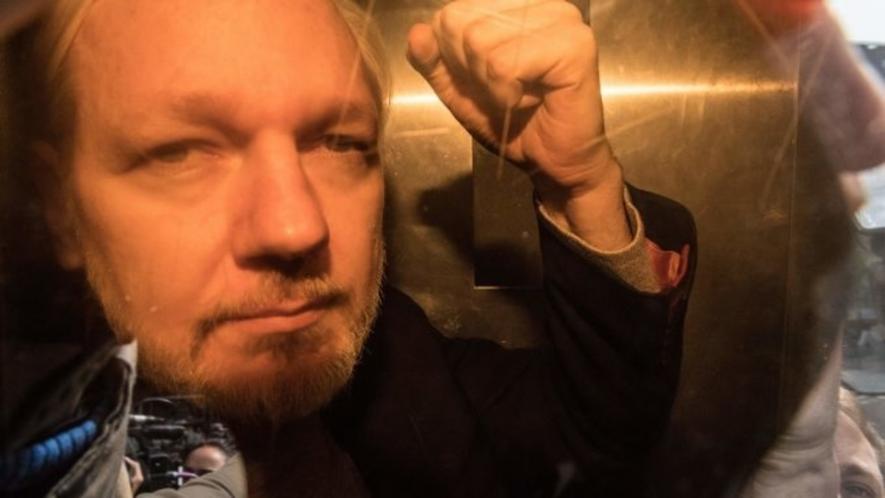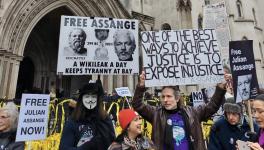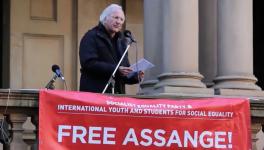Julian Assange and the Heavy Price of Exposing US Imperialist Crimes

The extradition hearings of WikiLeaks founder Julian Assange resumed on Monday, September 7. Despite a global outcry against his persecution, the US and its ally the UK seem determined to ensure that Assange is published for the crime of speaking truth to power and exposing war crimes and corruption. Here is a timeline of the the continuous and sustained campaign against Assange and Chelsea Manning.
October 4, 2006 – Julian Assange founds WikiLeaks. One of its key goals is to publish “original source material alongside our news stories so readers and historians alike can see evidence of the truth.” From the beginning, it publishes classified government documents leaked by whistleblowers or provided by hacktivists that prove corruption and other irregularities by those in power.
November 2009 – US Army intelligence officer Chelsea Manning comes across a video of the 2007 Baghdad airstrike that killed more than a dozen people, including journalists employed by Reuters, and wounded two children, among others. She also comes into contact with WikiLeaks in the same month.
January 2010 – Manning downloads a cache of logs about the involvement of US forces in the Iraq and Afghanistan wars.
February 2010 – Manning approaches various news media houses to publish the documents but is rejected. Manning later approaches WikiLeaks. In the meanwhile, Manning also downloads diplomatic cables from different US embassies. WikiLeaks publishes some of these later in the month.
April 5, 2010 – Wikileaks publishes the unedited Baghdad airstrike video. The video is titled ‘Collateral Murder.’
May 27, 2010 – Manning is arrested from Iraq, where she is posted, and moved to a US base in Kuwait by the end of the month, after she was reported by her confidante Andrian Lamo.
July 25, 2010 – WikiLeaks publishes the Afghan War Logs consisting of over 91,000 documents of the US war in Afghanistan that were provided by Manning.
July 29, 2010 – Manning is brought to the US, and formally indicted by federal prosecutors under several charges. The most serious charge is “aiding the enemy,” which carries a death penalty.
August 20, 2010 – Two Swedish women file a complaint against Assange, which leads to him being questioned by Swedish police over a possible sexual assault case. The case was eventually closed for lack of prosecutable evidence
September 1, 2010 – Swedish public prosecutor Marianne Ny reopens preliminary investigation into the sexual assault case.
October 22, 2010 – WikiLeaks publishes the Iraq War Logs, containing close to 400,000 field reports which eventually led to significantly updating the death toll of civilians in the Iraq war, exposing major coverups.
November 18, 2010 – Ny orders Assange’s arrest under multiple counts of sexual assault charges. Swedish courts issue Europe-wide arrest warrant against him. Assange who is London faces an extradition request from Sweden.
November 28, 2010 – WikiLeaks releases leaked diplomatic cables, containing over 250,000 documents from different US diplomatic missions, to major newspapers and media houses. The cables raise the question of extensive espionage and snooping of different governments and UN officials by the US, giving rise to the Cablegate controversy.
November 29, 2010 – US attorney-general Eric Holder states that an investigation to indict Assange and the Wikileaks under the Espionage Act is underway.
March 2011 – The total number of charges against Manning is updated to 22, including those under the Espionage Act and the Uniform Code of Military Justice. The charge of “aiding the enemy” was also included.
February 2011 and February 2012 – Assange faces extradition hearings at the behest of Sweden. An English local court upholds the warrant of arrest against Assange. The UK High Court upholds the extradition request and arrest warrant against Assange on November 2, 2011.
March 2012 – UN special rapporteur on torture, Juan E. Mendez, criticizes the conditions under which Manning is held in the US, stating that the treatment is akin to psychological torture. This follows a major controversy over Manning’s situation at a detention facility in Quantico, where she was deemed a suicide risk by authorities. After a political backlash over allegations of torture, the administration of Barack Obama later shifts Manning to a normal pretrial prison.
May 30, 2012 – The UK Supreme Court dismisses Julian Assange’s appeal against his extradition to Sweden.
June 19, 2012 – While on conditional bail, Assange seeks asylum at Ecuadorian Embassy in London.
August 16, 2012 – The Ecuadorian government under president Rafael Correa grants Assange full asylum.
June 3, 2013 – Trial against Manning begins in a military court.
July 30, 2013 – Manning is held guilty of 17 of the 22 charges. She is acquitted of the charge of aiding the enemy.
August 14, 2013 – Manning is sentenced to 35 years in prison. The verdict is widely criticized by human rights groups and media organizations as excessive.
August 12, 2015 – Swedish authorities drop some of the less serious charges after the statute of limitations ends.
June to July 2016 – Wikileaks and DNCLeaks release leaked e-mail communications among the Democratic National Committee, the executive wing of the US Democratic Party. Leaks reveal a major bias against presidential candidate Bernie Sanders.
November 25, 2016 – Wikileaks releases the Yemen Files, detailing US military operation in Yemen since 2009, and its role in the ongoing Yemen War by being the biggest arms supplier in the conflict.
January 17, 2017 – After much pressure from civil society groups and advocates, president Barack Obama commutes Manning’s sentence, based on a request filed by her in November 2016. She is released in May.
May 19, 2017 – Swedish chief prosecutor files an appeal to drop the arrest warrant against Assange at Stockholm court, effectively dropping investigations against him.
May 24, 2017 – Lenin Moreno takes office as the president of Ecuador, succeeding Correa.
November 2018 – Reports reveal a secret Grand Jury indictment of Julian Assange on unspecified charges in the United States. The information comes to light due to a ‘copy paste error’ in a court document. Reports also reveal that there is a standing arrest warrant against Assange in the US to this effect.
March 2019: Chelsea Manning is imprisoned for refusing to testify against Julain Assange in front of a Grand Jury. Except for a few days in May, she remains in prison till March 2020. She is also hit with a fine that rises to USD 1,000 a day for every day she is in prison.
April 11, 2019 – The Ecuadorian government under president Lenin Moreno revokes asylum granted to Assange. He is forcibly arrested from the embassy by the London Metropolitan Police. He is rearrested on a request from the US on a charge of conspiring to hack into a classified computer. The ‘conspiracy’ in the indictment refers to attempts by Assange and Manning to protect her identity as a source, and Assange’s encouraging Manning to find out more information on US atrocities. The charge carries a five-year prison term.
May 1, 2019: Julian Assange is sentenced to 50 weeks in prison on charges of jumping bail in 2012. The UN Working Group on Arbitrary Detention calls it a disproportionate sentence.”
May 2019: United Nations’ Special Rapporteur on Torture and other Cruel, Inhuman or Degrading Treatment or Punishment Nils Melzer says Assange’s human rights could be seriously violated to the US. “In addition to physical ailments, Mr. Assange showed all symptoms typical for prolonged exposure to psychological torture, including extreme stress, chronic anxiety and intense psychological trauma,” Melzer writes.
May 23, 2019: A new indictment sees Julian Assange facing 17 new charges, this time under the Espionage Act. The charges against Julian Assange carry a total maximum prison sentence of 175 years. This is the first time the US is prosecuting a publisher for the very act of publishing under the Espionage Act
September 13, 2019: Julian Assange will continue to remain in detention even after his prison term for jumping bail ends, rules judge. He is remanded to Belmarsh prison.
September 26, 2019: Spanish newspaper El Pais reveals that Undercover Global S. L, the Spanish company contracted to protect the Ecuadorian Embassy in London spied on Assange for US intelligence services. Audio and video clips of meetings Assange had with lawyers are activists were reportedly handed over to the CIA by the company’s director David Morales. Morales was arrested that month and is under investigation on charges of privacy violation, bribery and money laundering.
November 1, 2019: Nils Melzer says Julian Assange’s life is at risk. “In my view, this case has never been about Mr. Assange’s guilt or innocence, but about making him pay the price for exposing serious governmental misconduct, including alleged war crimes and corruption,” Melzer writes.
October 21, 2019: Julian Assange’s lawyers’ plea to extend the date of the extradition hearing in view of new developments in the case is dismissed. Assange declares in court, :“This superpower [the US] had 10 years to prepare for this case and I can’t [even] access my writings.”
November 19, 2019 – Swedish prosecutors decide to drop the investigation against Assange in the sexual harassment case.
January 3, 2020: A letter from November 2019 by Nils Melzer, the United Nations’ Special Rapporteur on Torture and other Cruel, Inhuman or Degrading Treatment or Punishment to the US government says the incarceration and hefty fine imposed on Chelsea Manning are akin to torture.
February 24-27, 2020: Julian Assange’s extradition hearing begins at Belmarsh prison even as protesters gather outside in his support. Assange’s lawyers state that he published classified documents to highlight human rights abuses. They point out that the relevant US-UK treaty does not permit extradition for political reasons. The hearing is adjourned till May and subsequently to September 7 due to the COVID-19 pandemic.
March 11, 2020: Chelsea Manning attempts suicide while in prison. She survives but is admitted to a hospital.
March 12, 2020: Judge Anthony Trenga of the US District Court passes the order to set Chelsea Manning free as the term of the Grand Jury she was supposed to testify before is set to expire. By the time of her release, Manning ends up with a fine of USD 246,000. Judge insists she pay the fine in full. A crowdfunding campaign raises the amount in two days.
March 10, 2020: The International Bar Association’s Human Rights Institute condemns the mistreatment of Julian Assange during his extradition healing in February, terming it shocking and excessive. Referring to Nils Melzer’s statement that Assange was a victim of psychological torture, the institute says “his extradition would be illegal under international human rights law.”
March 25, 2020: Julian Assange’s bail plea is denied. His lawyers had applied for bail citing the spread of COVID-19 in prisons in the UK. Assange’s defense team argues that in case of a COVID-19 outbreak at the prison, he would be very vulnerable owing to his weak health. Assange’s deteriorating health had been noted in previous hearings, during which he had trouble hearing the judge or following the case itself
June 25, 2020: Doctors for Assange, a campaign endorsed by 216 medical professionals from 33 countries publishes a letter in the Lancet, demanding an end to the “end the torture and medical neglect of Julian Assange.”
August 2020: Reporters Without Borders, in an appeal to the UK government, opposes the extradition of Assange to the US. Pointing out that Julian Assange’s contribution to journalism is undeniable, RSF urges “the UK government to prioritize the principles of freedom of expression and the defense of journalism in its treatment of Assange.”
This article was first published in Peoples Dispatch.
Get the latest reports & analysis with people's perspective on Protests, movements & deep analytical videos, discussions of the current affairs in your Telegram app. Subscribe to NewsClick's Telegram channel & get Real-Time updates on stories, as they get published on our website.























